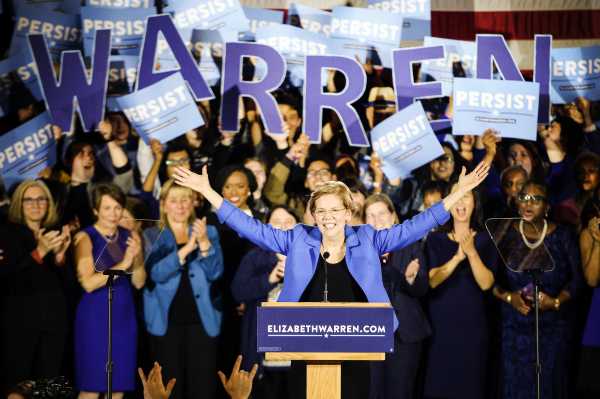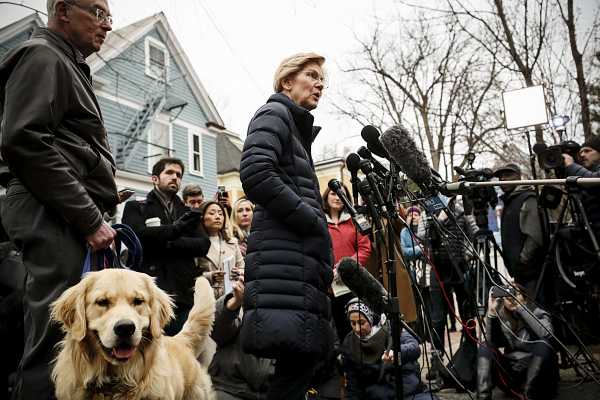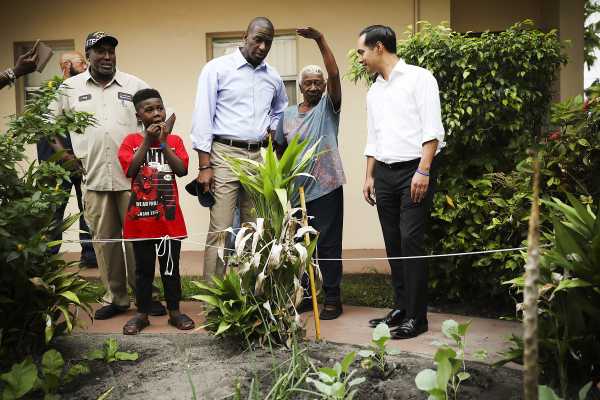
For the next few months, you’re going to hear a lot of high-profile Democrats announce they are forming an “exploratory committee” for a 2020 White House run. Elizabeth Warren and Julián Castro have taken that step. More will certainly follow.
When the words “exploratory committee” flick across your Twitter stream or TV screen, it means two things:
Presidential candidacies have become a two-step dance. First, you announce you are exploring a run for president. Then you announce you are running for president. Barack Obama announced an exploratory committee in January 2007 and then made it official in February. Mitt Romney starting exploring in April 2011 and then formally joined the race at the beginning of June. It’s not a must, though: Hillary Clinton went ahead and launched her 2016 campaign, without bothering with an exploratory committee.

It might sound silly — and, frankly, it kind of is! — but the “exploratory” phase has real value for candidates. They can raise a bunch of money. They can start polling and traveling and hiring staff. By the time they officially announce their candidacy, the campaign is in effect already up and, ah, running.
One side benefit: Candidates get two news cycles in the all-important bid to raise their profile with voters. They’ll get headlines once for the committee news and then again for the formal announcement.
In other words, “exploratory” is a bit of a misnomer in the presidential context. I asked a handful of election experts and nobody could name a notable person who established an exploratory committee and then declined to announce as a candidate. If you’re exploring, you’re running. The 2020 campaign has already begun.
The rules for a presidential exploratory committee, explained as best as they can be
Exploratory committees are subject to a bit of interpretation — in 2012, Newt Gingrich appeared to have had an unregistered committee but then just announced he was running for president; Jeb Bush broke the mold entirely in 2016 — but the typical version looks like this.
To form an exploratory committee, all a candidate really needs to do is file a statement of their candidacy to the Federal Election Commission and slap the word “exploratory” on the name of their campaign’s committee. That’s it.
But once you file a statement of candidacy, even if you use the “exploratory” label, you’re a candidate in the eyes of the law. “There is no legal distinction” between a campaign committee and this kind of exploratory committee, Brendan Fischer, who works on federal reform at the Campaign Legal Center, says.
(Another type of committee — known as a “testing the waters” committee — used to be more popular because fewer
Because politicians are already, in effect, candidates once they form an exploratory committee, they usually don’t take long before making an official announcement. Obama and Romney waited roughly a month before they stopped exploring their candidacy and started really running. Castro is set to formally announce his candidacy less than two weeks after he revealed he had set up an exploratory committee.
Exploratory committees end up looking a lot like the real campaign too. Candidates-to-be have to document and report their fundraising and spending. They can conduct polling on their potential candidacy. They can travel, with the exploratory committee covering the cost. They can even hire staff: Warren’s exploratory committee already announced that it was hiring a handful of operatives in Iowa, an important early state on the primary calendar, a few days after it came into being.
Most importantly, they can raise money. That is one of the real values of establishing an exploratory committee: Candidates can start building the financial foundation of their campaign. The committees are subject to the federal limits on campaign contributions ($2,700 for an individual, $5,000 for a PAC) because the potential candidates are already, legally speaking, real candidates.
Candidates can bring in a good haul before formally launching their campaign. Obama raised nearly $7 million from January 7, 2007, when he said he was forming an exploratory committee, to February 10, when he formally announced his candidacy, according to FEC data I pulled. Romney raised $9 million during his 2011 exploratory phase.
That all probably sounds straightforward, if a little legally convoluted. In theory, it is. But lately, candidates have found some creative ways to up the ante and raise even more cash for their eventual campaigns, a development that is worrying to campaign finance hawks.
Jeb Bush in January 2015 set up a Super PAC that effectively served as an exploratory committee for a presidential run. Because it was a Super PAC, the group, Right to Rise, could raise unlimited funds (hitting $100 million around the time Bush formally announced his run), but it could not transfer money to his official campaign, as a traditional exploratory committee would.
The new scheme faced scrutiny from campaign finance watchdogs who argue that Bush (and some others, like Democrat Martin O’Malley) was circumventing election rules by substituting a PAC for an actual exploratory committee, which they say is the proper venue for a potential candidate’s fundraising and activities.
An FEC complaint is still under review, but the kerfuffle was a useful reminder that an exploratory committee is, in a certain sense, whatever you want it to be. But if you want to follow the rules strictly, the above is what you’re really supposed to do.
There will be so many 2020 presidential exploratory committees. It means they’re running.
So far, Castro and Warren have gone the traditional route, forming an exploratory committee by filing their statement of candidacy with the FEC and then adding the word “exploratory” to their campaign committee’s name.

They can start raising money, running polls, and paying for travel. Warren’s committee has already hired veterans of the Obama, Clinton, and Bernie Sanders campaigns to start laying the groundwork for the “potential” campaign in Iowa. The Massachusetts senator is heading to Iowa this week for her first political events since starting her presidential exploration.
Castro isn’t staying in the exploratory period for very long, as he is expected to formally announce on January 12. His exploratory committee will have lived for less than two weeks before it transitions into the real campaign.
Not every candidate will bother forming their own exploratory committee. Former US Rep. John Delaney (D-MD) is already announced as a candidate for president, and he’s more or less lived in Iowa for two years. West Virginia state Sen. Richard Ojeda, who narrowly lost a House election in Trump country in the midterms, has also filed his candidacy paperwork with the FEC, with no “exploratory” language to hedge.
Possible top-tier candidates like Joe Biden and Bernie Sanders — who enjoy universal name recognition and have a more established political infrastructure — could also take the Hillary Clinton route and simply skip straight to their official candidacy if they don’t feel like they need the glide path an exploratory committee provides.
Somebody could also follow Jeb Bush’s example, bucking a traditional exploratory committee for a more lucrative PAC. But that could be a hard sell when trying to win over grassroots Democratic voters who loathe the out-of-control, post-Citizen United campaign spending. That approach also risks unwanted FEC scrutiny.
Exploratory committees are an oddity of American politics, a bit of playacting before the actual campaign gets going. For a House and Senate campaign, these committees might hold some legitimate value in assessing the viability of a candidacy. But for presidential contenders, they are just a formality. I’ve yet to find any notable examples of a presidential exploratory committee not leading to an official candidacy, even a bid that ends as quickly as Minnesota Gov. Tim Pawlenty’s did in 2011.
And the fundraising, hires, and brand building that occur under the auspices of an exploratory committee can be substantial. These campaigns-in-waiting aren’t twiddling their thumbs, waiting for their candidates to jump in. The work has already begun.
So don’t let the semantics confuse you: Elizabeth Warren, Julián Castro, and their fellow explorers to follow are already off and running.
Sourse: vox.com






